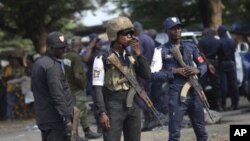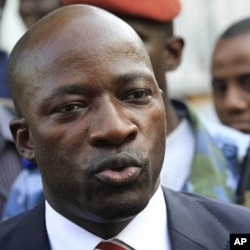Supporters of incumbent Ivorian president, Laurent Gbagbo, say they are ready to fight to the death to keep him in power, while the United Nations points to growing evidence of "massive violations of human rights" since last month's disputed presidential election.
In Ivory Coast, incumbent President Laurent Gbagbo refuses to cede power to Alassane Ouattara, who was recognized by the United Nations and much of the international community as the winner of the November 28 presidential run-off.
The United Nations is reporting a wave of killings and abductions since the poll. U.N. High Commissioner for Human Rights Navi Pillay issued a statement Sunday saying more than 50 people have been killed and more than 200 injured in violence since Thursday.
The announcement came a day after the United Nations said it would not abide by Mr. Gbagbo's demand that U.N. peacekeepers withdraw from the country.
Gbagbo's supporters, led by militant youth leader Charles Ble Goude, accuse foreigners of threatening Ivory Coast's sovereignty and have vowed to fight to the death to keep Mr. Gbagbo in power.
Africa security analyst J. Peter Pham of the New York-based National Committee on American Foreign Policy says the situation is entering a critical phase.
"On a strategic level, it certainly does not help Gbagbo to create the chaos which might justify an armed international intervention," said Pham. "In fact, his endgame might be to maintain the political pressure but actually stop short of the threshold that would provoke an intervention. Now, whether he can maintain that balance, I think, is the key question for the next several days and weeks."
Regional efforts at mediation and threats of international sanctions have done little to ease the political gridlock that looks increasingly close to plunging the country back into a civil war that in 2002-2003 split the country between a rebel-held north and a government-held south.
International Crisis Group's Ivory Coast analyst, Rinaldo Depagne, says there is no negotiation on the horizon and the situation could disintegrate into an intense conflict in the days, weeks or months ahead. He says there is not much to negotiate, other than the departure of Gbabgo, who has carried out what Depagne calls an institutional coup d'etat.
Depagne said failed official disarmament and subsequent unofficial rearmament on both sides since the 2007 Ouagadougou peace accords makes current tensions all the more dangerous.
A spokesman for U.N. Secretary General Ban Ki-moon has said that the U.N. mission in Ivory Coast will fulfill its mandate and warned that "any attack on U.N. forces will be an attack on the international community and those responsible for these actions will be held accountable."
The U.N. Security Council is set to meet to discuss the mandate of the U.N. mission in Ivory Coast, which is to expire December 31st and currently charges the peacekeeping mission to protect civilians. Ouattara's camp has called for the U.N. mission's mandate to be renewed and strengthened.
The European Union has agreed to ban Mr. Gbagbo and 18 of his allies. ECOWAS and the African Union have suspended Ivory Coast. The United States and Canada have threatened sanctions.
The United States has advised Americans not to travel to Ivory Coast and ordered non-emergency staff out of the country, citing the deteriorating situation and what it called "growing anti-western sentiment."
Original electoral commission results said Mr. Ouattara won the run-off election with 54 percent of the votes, but the constitutional court, which is led by a Gbagbo ally, annulled 10 percent of ballots as fraudulent and proclaimed Mr. Gbagbo the winner with 51 percent.
Both men have set up rival governments and have the support of rival armed forces. Gbagbo controls state media and government buildings under the protection of government troops, while Ouattara's government is based out of an Abidjan hotel under the protection of U.N. peacekeepers and former rebel fighters.





